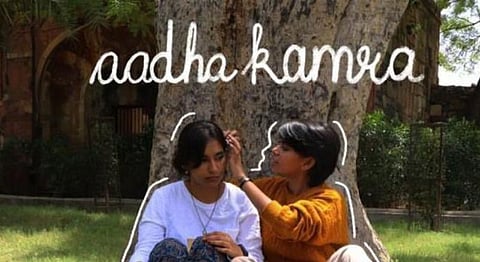
- HOMEGROWN WORLD
- #HGCREATORS
- #HGEXPLORE
- #HGVOICES
- #HGSHOP
- CAREERS
- ABOUT US
- CONTACT US

In an interview with Homegrown last year, 21-year-old poet and visual artist Anureet Watta said, “Whatever I create, be it a short film, a poem, an illustration or anything else, comes out of how I see the world and how I think the world sees me. So, yes, identity plays a huge role right from what I choose to create to how I create it. It’s an unsaid thing, even works which are not explicitly about queerness are shaped through a queer gaze simply because I have created it.” Their latest creative pursuit is a short film that carries this in the same vein.
The second directorial short film by Watta, ‘Oranges in the Winter Sun’ produced by Lotus Visual Productions chronicles the story of two queer individuals in the city of Delhi. It delves into themes of memory, and familial violence and also looks at the city of Delhi from a queer lens. As a part of this film, Watta along with their creative team consisting of— Akriti Tiwari (co-lyricist), Usha (co-writer of the film), Ambreesh Parathasarathy (composer) and Aishwarya Singh (singer) and others have composed an original song, titled ‘Aadha Kamra.’
The song as well as its music video explores the lived realities of queerness as well as the glorious futurisms imagined by queer people. Delving into the idea of how queerness is always in bargain with the world, materially and otherwise. It’s a song about this bargain which isn’t settled for but made do for a little while. It is about taking back power, first in dreams and then in reality. Of the music video, this is what the four creatives had to say.
Anureet Watta (co-lyricist)
There is an inane fantasy for a better place in all of us especially those that have been kept out of the vibrant imaginations of the world. ‘Aadha Kamra’ is about an alternative imagination. It’s about the infinity of a room that is built on dreams. It’s queer of course but it doesn’t end at love.
Love is simply a blanket that all the braver things wrap around them in the frost of a world that is built on hate. ‘Oranges in the Winter Sun’, the film in itself is about this warmth. Of writing out the world from queer narratives that seemed to plagued by it. As are our lives. But the world must be written out at some point, or at some point it may have to stop being the antagonist.
Akriti Tiwari (co-lyricist)
This is not a love song. This is a song of hope. Sometimes you not only have to fight the world for love but also your love, for it to stay. This song is about staying, fighting and loving.
Usha (co-writer of the film)
“Aadha Kamra” - It means a variety of things, including the fact that most of our hopes, ideas, and thoughts as well as our very existence and the air we breathe - are borrowed and never truly belong to us.
It also goes in the context of queer spaces since this world isn’t totally ours in fact half of the world rejects us so we built a world that’s exclusively ours, and even if it’s unfinished (aadha kamra) it still gives us safety, hope and a sense of belonging.
It also implies that we have already taken half of the world and that if we hold on we might also be able to conquer the remaining half or that some of us don’t want the other half because everyone has different dreams and some people just want enough space to be able to breathe and rest without having to fight, which is totally acceptable.
Aishwarya Singh (singer)
Matching the feeling of ‘abhi na jao’ was a difficult task. This song is very popular in the heteronormative context. I wanted to claim this song into the film because I’ve always felt these feelings for my lover and in my context. When I read the first draft of aadha kamra, I felt joy and by the time my eyes reached the end of the text, they were filled with tears. It was ours—fully and wholly.
The idea of singing an original was nerve-wracking for me, and this song felt more like a memoir, a narration weaved into a melody. It felt like putting a most vulnerable part of me in front of the world
Anika, Ambreesh, and I spoke the language of music to fine-tune the composition. The minor note changes and retakes and going soft at places started falling into place.
A scream into the void, a song that starts after my tears have ended, an effort to regain the lost space, affirm the lost power. My favourite line is ‘mulzim hain hum thoda sehte hain’ so much so, that I always sang it.
You can stream the song on Spotify here.
If you enjoyed reading this, we suggest you also read:
